News of Robin Williams’ shocking suicide on August 11, is still reverberating. Details of Williams’ death are gruesome: he tried to slit his wrists and when his penknife, and when it didn’t work, he hanged himself with his belt.
Anyone who has suffered from depression understands why Williams killed himself, even if we wish he hadn’t. Depression is overwhelming and the pain crushing, suicide often feels like the only cure.
Nearly 40,000 Americans killed themselves last year, according to the Centers for Disease Control (CDC). A May 2013 CDC report noted that the number of suicides has been rising dramatically among the key demographic for suicide, which is not teenagers or the elderly, even though media focus is on them. Middle-aged people–40 to 64–are the most likely to commit suicide, like Williams.
The CDC reports nearly a third of all suicides in the U.S. are among people in that age group and that the suicide rate among Americans aged 35 to 64 rose by nearly 30 percent over the past decade.
The CDC notes that suicide now outranks car accidents as a leading cause of death. Suffocation by hanging, Williams’ method of suicide, is now the most common choice among women, edging out poisoning, and second most common after guns among men. Suicide by hanging has risen more than 80 percent in the past ten years.
These details are grim, but the statistics for women are even grimmer. More than 100 people a day kill themselves in the U.S., and among those suicides, lesbians and bisexual women are more likely to kill themselves than heterosexual women. More women attempt suicide than men, but men are more often successful–perhaps because they are more likely to use guns.
Depression is the leading cause of suicide, yet if you Google lesbians and depression, the Office of Women’s Health of the U.S. Department of Health and Human Services–the nation’s largest health website, paid for with your tax dollars–offers only two brief paragraphs on depression and anxiety in lesbians and bisexual women. Yet that’s approximately 20 million women in the U.S.
This is what it says: "Many factors cause depression and anxiety among all women. However, lesbian and bisexual women report higher rates of depression and anxiety than other women do. Depression and anxiety in lesbian and bisexual women may be due to: Social stigma, rejection by family members, abuse and violence, unfair treatment in the legal system, stress from hiding some or all parts of one's life, lack of health insurance.
"Lesbians and bisexuals often feel they have to hide their sexual orientation from family, friends and employers. Bisexual women may feel even more alone because they don’t feel included in either the heterosexual community or the gay and lesbian community. Lesbians and bisexuals can also be victims of hate crimes and violence. Discrimination against these groups does exist, and can lead to depression and anxiety. Women can reach out to their doctors, mental health professionals and area support groups for help dealing with depression or anxiety. These conditions are treatable, and with help, women can overcome them."
So: We experience more depression and anxiety, but "with help women can overcome them."
This sounds a little like "pull yourselves up by your bootstraps, ladies, and get a grip."
Seek help, even though "lack of health insurance,""unfair treatment by the legal system" and "isolation and stigma" are listed as reasons for both depression and anxiety among lesbians and bisexual women.
But we can’t just snap ourselves out of depression and certainly not out of the kind of depression Williams was experiencing where suicide seems like a viable answer–or worse, the only viable answer. That kind of suffering requires outside help, but many lesbians don’t know how to find it or have been told–like on that website–that it’s easy-peasy. Also, because lesbians have often been medicalized and their lesbianism treated like a disease in itself, many women are wary of talking to mental health professionals or their doctors, for fear of being told their lesbianism is the cause of their depression.
Except it sort of is. The extreme pressures of a homophobic society cannot be minimized. This is just not something heterosexual women have to deal with. No one has to come out as straight to family, friends or employers and that stress alone can be crushing.
Now toss in these facts: A 2012 report from the Substance Abuse and Mental Health Services Administration (SAMHSA) detailed a 49 percent increase in ER visits for drug-related suicide attempts for women aged 40 and older.
In addition, women aged 40-64 are more at risk of killing themselves than other women, according to new data on suicide rates over the past 15 years. According to the CDC, 60 percent of suicides among women were among women in that 40-64 age group.
What is making us kill ourselves?
Depression.
One in five Americans has or will suffer from depression. Among them, women 35-60 represent the fastest growing group of people being treated for depression in the country.
Dr. Esther Rothblum has written extensively on women and depression and is one of the few people writing at all about lesbians and depression. In Depression Among Lesbians: An Invisible and Unresearched Phenomenon, Rothblum states, "Despite the research emphasis on depression among women, there has been virtually no focus on depression among lesbians." She also says that lesbians "experience hostility and invisibility from the macro-culture."
Rothblum cites the National Lesbian Health Survey from the National Institute for Mental Health (NIMH) which showed that depression was the primary reason lesbians sought mental health help.
The Vanderbilt University School of Medicine program for LGBTI health notes, "Women who have sex with women have higher rates of depression and anxiety compared to others. These problems are often worse for women who are closeted or don’t have adequate social support." This puts lesbians and bisexual women at greater risk of suicide, according to the program.
So: we’re officially depressed, we need help, we can’t access it and no one is paying attention to the emotional and psychological danger we are in, which can make us suicidal.
Not good.
Consider that 8 million Americans reported having suicidal thoughts last year and another 3 million made a suicide plan. There is one suicide for every 25 attempted suicides and more than a million Americans reported attempting suicide last year. Women are more likely than men to attempt suicide. Lesbians and bisexual women are more likely to attempt suicide than heterosexual women.
But some of these numbers skyrocket in particular demographics. Lesbians and bisexual women have the highest rate of attempted suicide among adults and LGBT teenagers have the highest rate of attempted suicides among teens. Teens attempt suicide five times as often as adults, but are rarely successful. For every teen suicide there are more than 100 attempted suicides.
In 2007, the American Foundation for Suicide Prevention (AFSP) began a "broad initiative to increase knowledge about suicide and suicide risk in lesbian, gay, bisexual, and transgender (LGBT) persons, and take steps to reduce that risk."
But we are still at risk. Since Phyllis Chesler wrote her groundbreaking book Women and Madness in 1972 and lesbian feminist Kate Millett wrote The Loony-Bin Trip in 1990, there has been almost no mention of lesbians and depression or lesbians and suicide. Some lesbians have written about their personal struggles with mental illness, depression and suicide attempts, but there are no current books on lesbians and depression. Queer Blues: The Lesbian and Gay Guide to Overcoming Depression bills itself as the only book on the topic and it is. The only problem? It was published in 2001.
How is it possible that we have so few resources for our own community when every study says lesbians and bisexual women are in desperate need of help?
In his book The Noonday Demon: An Atlas of Depression, gay writer Andrew Solomon writes about the perils of depression and the role being gay played in his own experience. Solomon explains, "I was overpowered by being in the world, by other people and their lives I couldn’t lead, their jobs I couldn’t do–overpowered even by jobs I would never want or need to do."
That sense of being overpowered is described by many people who have experienced depression. But Solomon explains that it can be survived. "The people who succeed despite depression do three things. First, they seek an understanding of what's happening. Then they accept that this is a permanent situation. And then they have to transcend their experience and grow from it and put themselves out into the world of real people."
Recognizing you are depressed is an essential first step. As Solomon says, "Depressed people cannot lead a revolution because depressed people can barely manage to get out of bed and put on their shoes and socks."
Getting help is vital. Despite the blithe comments of the HHS website, it is difficult for lesbians to seek help for depression. Coming out to doctors and mental health professionals, fear of being stigmatized–either as a lesbian or as someone with mental illness, is daunting. But it must be done.
The idea that you can snap yourself out of depression is simply wrong. Therapy, medication, even hospitalization is the only way out. If we have learned anything from Williams’ suicide it’s that even highly successful, highly motivated, seemingly highly functional people can also be so deeply depressed that the only way out for them seems to be suicide.
Seek help–it’s somewhere. The Gay and Lesbian Medical Association (GLMA) asserts that LGBT people must come out to their health care providers in order to get appropriate care. This includes mental health care. GLMA points out that talking to your health care provider will help to put your depression in context.
Depression resources for LGBT people include Promises Treatment Centers, 1-866-829-4052, which takes most health insurance but can also refer you.
If you are feeling suicidal, or even are just having suicidal thoughts, call the National Hopeline Network 1-800-SUICIDE or 1800-273-TALK. There is also 1-866-4-U-TREVOR for LGBT teens and young adults. Suicide.org also has a survivors forums for LGBT people who have attempted suicide or lost someone to suicide. If you don’t know where/how to find a mental health care provider who is either LGBT or LGBT-friendly, contact the Gay and Lesbian Medical Association, the Association of Gay and Lesbian Psychiatrists or the Association for Lesbian, Gay, Bisexual and Transgender Issues in Counseling.
Know what depression is. It’s not just a bad day. It’s only bad days. These are the signs:
Depressed mood.
Inability to feel pleasure.
Changes in sleeping and eating patterns
Weight change
Fatigue
Sense of worthlessness
Difficulty in concentrating or making decisions
Recurrent thoughts of death; suicidal
Many LGBT people are dealing with depression. If you are one of them, get help before it’s at a crisis point. Depression is an illness. And while it often cannot be cured, it can be managed. Don’t become a statistic.
Victoria A. Brownworth is an award-winning journalist, editor and writer and the author and editor of nearly 30 books. She has won the NLGJA and the Society of Professional Journalists awards, the Lambda Literary Award and has been nominated for the Pulitzer Prize. She won the 2013 SPJ Award for Enterprise Reporting in May 2014. She is a regular contributor to The Advocate and SheWired, a blogger for Huffington Post and a contributing editor for Curve magazine and Lambda Literary Review. Her reporting and commentary has appeared in the New York Times, Village Voice, Los Angeles Times, Boston Globe and Philadelphia Inquirer. Her book, From Where We Sit: Black Writers Write Black Youth won the 2012 Moonbeam Award for cultural&historical fiction. Her novels, Ordinary Mayhem and Cutting will both be published in winter 2014. @VABVOX


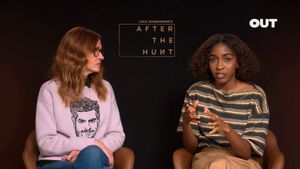




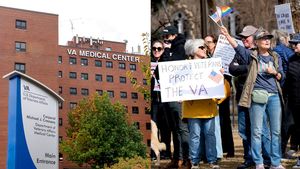



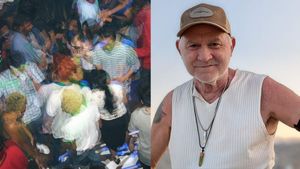






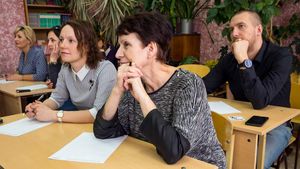
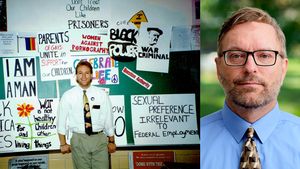



































































 Cindy Ord/Getty Images
Cindy Ord/Getty Images

























